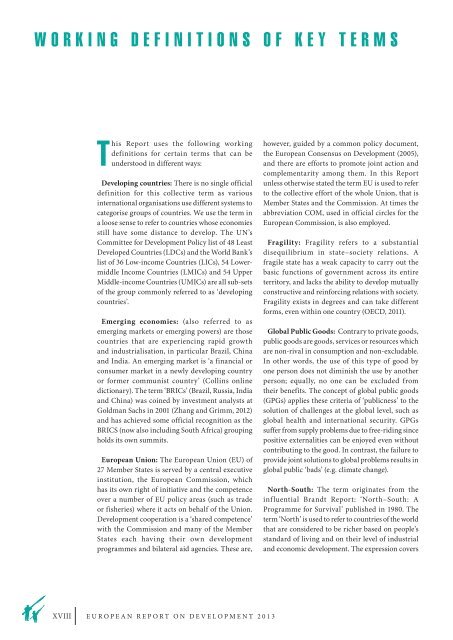Post 2015: Global Action for an Inclusive and Sustainable Future
Post 2015: Global Action for an Inclusive and Sustainable Future
Post 2015: Global Action for an Inclusive and Sustainable Future
Create successful ePaper yourself
Turn your PDF publications into a flip-book with our unique Google optimized e-Paper software.
WORkIng DEFInITIOnS OF kEy TERmS<br />
xvIII<br />
This report uses the following working<br />
definitions <strong>for</strong> certain terms that c<strong>an</strong> be<br />
understood in different ways:<br />
Developing countries: there is no single official<br />
definition <strong>for</strong> this collective term as various<br />
international org<strong>an</strong>isations use different systems to<br />
categorise groups of countries. We use the term in<br />
a loose sense to refer to countries whose economies<br />
still have some dist<strong>an</strong>ce to develop. the un’s<br />
committee <strong>for</strong> Development policy list of 48 least<br />
Developed countries (lDcs) <strong>an</strong>d the World b<strong>an</strong>k’s<br />
list of 36 low-income countries (lIcs), 54 lowermiddle<br />
Income countries (lmIcs) <strong>an</strong>d 54 upper<br />
middle-income countries (umIcs) are all sub-sets<br />
of the group commonly referred to as ‘developing<br />
countries’.<br />
Emerging economies: (also referred to as<br />
emerging markets or emerging powers) are those<br />
countries that are experiencing rapid growth<br />
<strong>an</strong>d industrialisation, in particular brazil, china<br />
<strong>an</strong>d India. <strong>an</strong> emerging market is ‘a fin<strong>an</strong>cial or<br />
consumer market in a newly developing country<br />
or <strong>for</strong>mer communist country’ (collins online<br />
dictionary). the term ‘brIcs’ (brazil, russia, India<br />
<strong>an</strong>d china) was coined by investment <strong>an</strong>alysts at<br />
Goldm<strong>an</strong> Sachs in 2001 (Zh<strong>an</strong>g <strong>an</strong>d Grimm, 2012)<br />
<strong>an</strong>d has achieved some official recognition as the<br />
brIcS (now also including South africa) grouping<br />
holds its own summits.<br />
Europe<strong>an</strong> Union: the Europe<strong>an</strong> union (Eu) of<br />
27 member States is served by a central executive<br />
institution, the Europe<strong>an</strong> commission, which<br />
has its own right of initiative <strong>an</strong>d the competence<br />
over a number of Eu policy areas (such as trade<br />
or fisheries) where it acts on behalf of the union.<br />
Development cooperation is a ‘shared competence’<br />
with the commission <strong>an</strong>d m<strong>an</strong>y of the member<br />
States each having their own development<br />
programmes <strong>an</strong>d bilateral aid agencies. these are,<br />
EuropE<strong>an</strong> rEport on DEvElopmEnt 2013<br />
however, guided by a common policy document,<br />
the Europe<strong>an</strong> consensus on Development (2005),<br />
<strong>an</strong>d there are ef<strong>for</strong>ts to promote joint action <strong>an</strong>d<br />
complementarity among them. In this report<br />
unless otherwise stated the term Eu is used to refer<br />
to the collective ef<strong>for</strong>t of the whole union, that is<br />
member States <strong>an</strong>d the commission. at times the<br />
abbreviation com, used in official circles <strong>for</strong> the<br />
Europe<strong>an</strong> commission, is also employed.<br />
Fragility: Fragility refers to a subst<strong>an</strong>tial<br />
disequilibrium in state–society relations. a<br />
fragile state has a weak capacity to carry out the<br />
basic functions of government across its entire<br />
territory, <strong>an</strong>d lacks the ability to develop mutually<br />
constructive <strong>an</strong>d rein<strong>for</strong>cing relations with society.<br />
Fragility exists in degrees <strong>an</strong>d c<strong>an</strong> take different<br />
<strong>for</strong>ms, even within one country (oEcD, 2011).<br />
<strong>Global</strong> Public Goods: contrary to private goods,<br />
public goods are goods, services or resources which<br />
are non-rival in consumption <strong>an</strong>d non-excludable.<br />
In other words, the use of this type of good by<br />
one person does not diminish the use by <strong>an</strong>other<br />
person; equally, no one c<strong>an</strong> be excluded from<br />
their benefits. the concept of global public goods<br />
(GpGs) applies these criteria of ‘publicness’ to the<br />
solution of challenges at the global level, such as<br />
global health <strong>an</strong>d international security. GpGs<br />
suffer from supply problems due to free-riding since<br />
positive externalities c<strong>an</strong> be enjoyed even without<br />
contributing to the good. In contrast, the failure to<br />
provide joint solutions to global problems results in<br />
global public ‘bads’ (e.g. climate ch<strong>an</strong>ge).<br />
North-South: the term originates from the<br />
influential br<strong>an</strong>dt report: ‘north–South: a<br />
programme <strong>for</strong> Survival’ published in 1980. the<br />
term ‘north’ is used to refer to countries of the world<br />
that are considered to be richer based on people’s<br />
st<strong>an</strong>dard of living <strong>an</strong>d on their level of industrial<br />
<strong>an</strong>d economic development. the expression covers

















